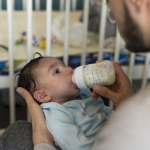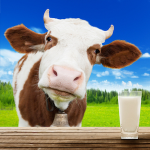Human milk is the gold standard for feeding babies — its benefits are well-known. And now formula manufacturers are bringing their products closer to the composition of breast milk by the addition of compounds — oligosaccharides — that are commonly found in mothers' milk.
breast milk
In an effort to understand how cow's milk allergies (CMA) form, an interdisciplinary team of scientists investigated if there's a link between certain kinds of sugars found in a mother's breast milk and the presence of CMA in her infant.
Breastfed babies who consume a particular type of sugar in their milk are more likely to be protected from colonization by Group B Streptococcus — a bacteria, which is a major cause of meningitis and other serious ailments in newborns. These sugars — oligosaccharides — are thought to encourage the growth of non-pathogenic bacteria in the baby's GI tract which, in effect, "crowds out" the dangerous ones.
The recent UNICEF report "From The First Hour of Life" looks at the present state of infant feeding, with particular focus on the benefits of breastfeeding, highlighting the barriers that exist and providing recommendations to overcome them. However, much of the data used to support these recommendations appear unrepresentative of a global population. This article will serve as part 1 of a series of articles attempting to validate the report in its entirety.
Dr. Phillipe Grandjean has a long and well-deserved reputation of being in the forefront of "toxic terror" campaigns. He has launched anxieties about all sorts of fish in our diets, but now he has become a devotee of warning nursing mothers about--of all things--potentially toxic chemicals in breast milk.
Genius or Dangerous? We say the latter.
Mothers who are not able to breastfeed are now starting to accept breast milk donations from other mothers or paying for breast milk obtained from online services. These breast milk donations and purchases the method sounds eerily similar to E-bay are unregulated and may actually be very dangerous for the baby.
Many new mothers want to feed their infants breast milk, but some are unable to do so for various reasons.
Here s a new fad to add to the list along with organic food and drinking unpasteurized milk: Mothers who are not able to breastfeed are now starting to accept breast milk donations from other mothers or paying for breast


